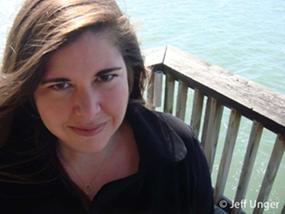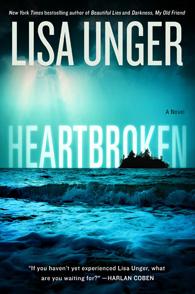
Lisa Unger is the author of 11 crime novels. In Heartbroken (Crown), her latest, three women find themselves connected by forces beyond their control. Willingly or not, they are thrown together and discover as much about themselves as they do about each other. Heartbroken will appeal to readers on many levels: the complexity of characters and themes will beguile the literary lover while the strategic plot twists and suspense will tantalize the thriller fan. Devoted Unger fans will not be disappointed, and as a stand-alone, new readers can easily make their Unger introduction with Heartbroken.
The psychology behind dysfunction has been a frequent theme in your books and shows up again in Heartbroken. Why the strong pull toward this theme?
We have this cultural ideal of the family all gathered around the holiday table in harmony and love. It's an iconic image. But the ideal is only a glittering surface. Beneath the table is all this psychology, all these mingling personalities. In every family there is conflict, bad chemistry, psychological symbiosis. There are predators and prey--albeit usually on a very small, personal scale.
It's the dichotomy of the ideal and reality that keeps me coming back to this theme. And there are as many variations as there are families.
I find the idea of family and how we are all intertwined endlessly fascinating. When two people come together as a couple, they haul in all this baggage from separate families. They carry with them heavy loads of history, possibly dysfunction, expectations and ideas that have been passed down through generations. Then, if those two people stay together and have children, they create a new family. And the mess of those two other families twist and wrap around each other. Meanwhile, that couple, over years creates their very own universe--there's a mythology, an evolving history--which may or may not be healthy and whole.
There is another strong theme in the novel, and that's the "haves" vs. the "have-nots"--at many levels, not just monetary. What inspired you to develop that theme so extensively in Heartbroken?
The idea of poverty of spirit is something that obsesses me. I see people with so much who are able to give very little. People who judge others harshly, but never question their own behavior. I see terrible snobs who nonetheless donate money to charity and consider themselves generous. And I have a ferocious curiosity to understand why.
In Heartbroken, Birdie has had every privilege and yet she can't even manage to be kind to her daughter. Kate, raised by the harsh and exacting Birdie, still turns out to be a wonderful mother to her own children. Emily, abandoned by her father and mistreated by her mother, doesn't really have the tools to make good choices. She easily falls prey to a dangerous man... and yet she knows right from wrong, is responsible for her actions. And her actions have terrible consequences. Why couldn't (didn't) she choose to do better?
There are no easy answers to these questions. We are all mosaics of our biology, environment, psychology--no two people are identical. And our choices often have consequences we can't predict. Whether we're talking about the layers of dysfunction or about the "haves vs. the have-nots," I find that complexity, that Gordian knot of the human condition, endlessly fascinating and never tire of exploring on it the page.
 Several times in the novel the idea of "there's a bit of autobiography in every novel" comes up. What does that mean to you and your books?
Several times in the novel the idea of "there's a bit of autobiography in every novel" comes up. What does that mean to you and your books?
The germ for a novel can come from anything--a line of poetry, a news story, a photograph, even a flyer in the mail. Then it's followed by a voice in my head or an image I see again and again. When that happens, I know that I'm connected to it in some really personal way. Without that personal connection, there's no novel. I simply wouldn't be able to sustain the passion it takes to write a book if I weren't personally invested in the journey.
On the page, I answer the questions I have about life, or at least I explore them in great depth. That's where the autobiography comes in for all my novels. Heartbroken isn't about a real place, or about a real family. But it is, in part, inspired by a painful encounter that led me to wonder why people behave as badly as they do, why some people have such a hard time loving and being loved, and why our hopes for family harmony are so often dashed upon the rocks of difficult personalities.
Have you ever had a writing experience where you started with that passion but it didn't maintain itself the entire time and you walked away from the project?
I have a few partials, stories that started and yet couldn't resolve themselves into novels. But it wasn't about a lack of passion. For example, the story I told in Fragile had tried to find its way out in a couple of different ways. But looking back, I realize that I wasn't ready in some sense to tell it. I wasn't the writer I needed to be; I didn't have enough life experience--the intellectual, emotional or mental tools I needed--to do the story justice. So I had to grow into Fragile. And the voices that wound up driving me through Fragile were much older than the voices I had abandoned in earlier drafts.
Passion alone isn't enough--faith, hard work and craft are also necessary to take you the distance in a novel. Like any organic process, there's ebb and flow to writing. There are days when the house burning to the ground couldn't keep me from the keyboard. And there are days when I lie around my office wondering if I'll ever figure out what's going to happen next. But I show up every day and have faith that the story is there and I'll write my way to it. Passion is at the core of what I do, and the heart of every story I tell. But it's tenacity that gets the job done.
Did the germ for the various plot lines Heartbroken come from the same inspiration or did you find separate inspirations that you ultimately thought fit well together?
I see Heartbroken as having three key players: Birdie, Kate and Emily. Though Kate is Birdie's daughter and Emily has a connection to the family as well, they couldn't be more different from each other. Each woman has experiences that set her completely apart from the other two. And yet, they all find themselves headed toward the same point on the map and connected in ways large and small. The same is true for the inspiration for the various elements of the plot and the characters that populate the novel--all very different, and yet connecting at the heart of this book.
Inspiration is tricky and slippery. And though there was an experience that was the impetus for the novel, what evolved from there has its roots in my various experiences, memories, and, of course, my very dark and twisted imagination. Emily, for example, came from a question I have been asking myself for years: Who is the person who sets fire to your life? And when you are unlucky enough to cross paths with her, where does she get her power? Even when you're doing everything "right," you could still wind up being a victim of someone--who in some ways may also be a victim. I wanted to know what happens when someone like Birdie and Emily collide. It's so easy to judge, to say that this type of person is good, and this other type is bad. But these intersections impress me as impossibly complicated, and Heartbroken is, in part, an exploration of that theme. --Jen Forbus of Jen's Book Thoughts

